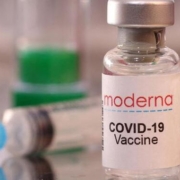Since the emergence of the COVID-19 pandemic, there has been increased interest in developing a universal antiviral that would stop a pandemic in its tracks.
Explainer: How North Korea’s COVID-19 outbreak could ignite a major health crisis
Coronavirus, Coronavirus Diagnostic Tests, Coronavirus Disease (COVID-19) Pandemic, Coronavirus Vaccines, COVAX Facility, COVID-19 Crisis, COVID-19 Deaths, COVID-19 Molecular Diagnostic Tests, COVID-19 self-testing kit, COVID-19 shots, COVID-19 Testing, Covid-19 Testing Guidance, COVID-19 Therapeutic, COVID-19 vaccination rates, COVID-19 Vaccinations, COVID-19 Vaccines, Diagnostic Tests, North Korea, Outbreaks, Pandemics, Politics, South Korea, Vaccinations, Vaccines, World Health OrganizationNorth Korea’s admission that it is battling an “explosive” COVID-19 outbreak raised concerns that the virus could devastate a country with an under-resourced health system, limited testing capabilities, and no vaccine program.
For years, researchers have been moving towards decentralized clinical trials (DCTs), and in a matter of months, COVID-19 changed the trajectory. Clinical operations teams and investigator sites around the world rose to the challenge and worked quickly to deploy new tactics to serve their study participants. The resulting reward is that DCTs, which can be leveraged smartly to reduce participant burden and improve recruitment and retention, are now becoming more widely adopted in design considerations. But rewards bring about new risks and challenges, and DCTs create new concerns for monitoring participant safety. Dario Lirio – Senior Director, LifeSphere Clinical at ArisGlobal – analyzes the risks and rewards of DCTs.
Half of the COVID-19 patients discharged from a Chinese hospital in early 2020 still have at least one symptom two years later, a new study shows. Additionally, new findings suggest patterns of inflammatory proteins in the blood of people with long COVID may someday help guide individualized treatment.
U.S. will share COVID-19 vaccine technology, Biden tells global summit
Antivirals, BNT162b2 (Pfizer and BioNTech), Congress, Coronavirus Disease (COVID-19) Pandemic, Coronavirus Vaccines, COVID-19 Therapeutic, COVID-19 therapeutic candidates, COVID-19 Therapeutics, COVID-19 Therapies, COVID-19 Vaccines, Janssen COVID-19 Vaccine (J&J), Joe Biden, mRNA-1273/Moderna COVID-19 Vaccine (Moderna), Pandemic Preparedness, Pandemics, Summits, Therapeutics, U.S. government, United States, Vaxzevria (previously COVID-19 Vaccine AstraZeneca), WHO, World Bank, World Health OrganizationThe United States will share technologies used to make COVID-19 vaccines through the World Health Organization and is working to expand rapid testing and antiviral treatments for hard-to-reach populations, President Joe Biden said on May 12.
Generic drugmakers to sell Pfizer’s Paxlovid for $25 or less in low-income countries
Clinton Health Access Initiative (CHAI), COVID-19 Therapeutic, COVID-19 Therapeutics, COVID-19 Therapies, Drug Pricing, Generic Substitution, Generics, Low-Income Countries, Medicines Patent Pool, Middle-Income Countries, Pfizer, Therapeutics, United NationsSeveral generic drugmakers that will produce versions of Pfizer’s COVID-19 antiviral treatment Paxlovid agreed to sell the medicine in low-income and middle-income countries for $25 a course or less, the Clinton Health Access Initiative (CHAI) said on May 12.
Biden marks 1 million Americans dead from COVID
Congress, Coronavirus Disease (COVID-19) Pandemic, Coronavirus Disease 2019 (COVID-19), Coronavirus Disease 2019 (COVID-19), Coronavirus Infections, Coronavirus Mutations, Coronavirus Restrictions, Coronavirus surge, COVID-19 booster shots, COVID-19 Deaths, COVID-19 Infections, COVID-19 shots, COVID-19 Therapeutic, COVID-19 therapeutic candidates, COVID-19 Therapeutics, COVID-19 Therapies, COVID-19 treatment pill, COVID-19 vaccination rates, Covid-19 Variants, Joe Biden, Pandemics, Reuters Tally, SARS-CoV-2 virus, Severe Acute Respiratory Syndrome Coronavirus 2 (SARS-CoV-2), Summits, United States, White House, White House coronavirus task forcePresident Joe Biden on May 12 commemorated the death of 1 million people in the United States from COVID-19, marking what he called “a tragic milestone” and urging Americans to “remain vigilant” amid the ongoing pandemic.
North Korea reports first COVID outbreak, orders lockdown in “gravest emergency”
Coronavirus, COVAX Facility, COVID-19 Infections, COVID-19 Lockdown Measures, COVID-19 vaccination rates, COVID-19 Vaccinations, North Korea, Omicron (B.1.1.529) (South Africa), Outbreaks, Pyongyang, South Korea, World Health OrganizationNorth Korea reported the country’s first COVID-19 outbreak on May 12, calling it the “gravest national emergency” and ordering a national lockdown, with state media saying an Omicron variant had been detected in the capital, Pyongyang.
Moderna Inc. has made all necessary submissions required by the U.S. Food and Drug Administration for emergency use authorization of the company’s COVID-19 vaccine in adolescents and children.
Just as Emergent BioSolutions looked to be making some headway in course corrections following a production mishap that ruined millions of doses of Johnson & Johnson’s COVID-19 vaccine, new information indicates the Maryland-based company sought to hide the deficiencies from federal regulators, all while touting its manufacturing capabilities, according to a BioSpace article.






 Reuters
Reuters

